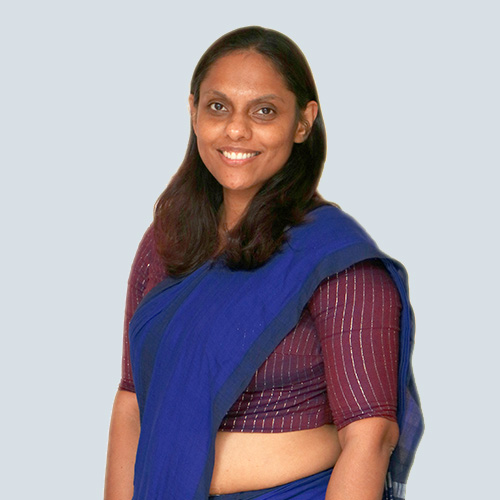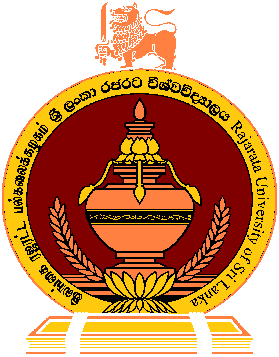 Biography
Biography
I received my BS (2003) from University of Peradeniya Sri Lanka in Physical Sciences and MS (2008) and PhD (2012) from the University of Missouri at St. Louis, USA in Physics. From 2017 – 2018, I worked as a Postdoctoral Research Fellow at the Center for Micro-Photonics in Swinburne University of Technology, Australia where I applied Machine Learning Techniques to Flowcytometry data in order to explore a better technique to automate the existing sequential manual first gating strategy. I am currently employed as a Senior Lecturer in Physics at the Department of Physical Sciences in Rajarata University of Sri Lanka.
As an interdisciplinary physicist I lead the Interdisciplinary Quantitative Modelling Research Group at the Faculty of Applied Sciences. I am particularly interested in studying complex systems in biology and society and applying data science to solve real world problems. My group works closely with domain specialists – neuroscientists, molecular microbiologists, ecologists, statisticians, data scientists and anthropologists – to build computational models that address biomedical and anthropological research questions. I believe that the increasingly data–intensive nature of scientific research means that many problems are best addressed by investing in, developing and applying modern techniques from artificial intelligence, machine learning, and statistics. I have worked hard to develop my capabilities in these areas and anticipate that the researchers who will make the most scientific impact are those with both a deep understanding of statistical learning techniques and a strong commitment to applying them to socially important problems. We develop and use big data, machine learning, mathematical physics and data science methods to address health and biomedical research questions (e.g. developing models to, understand and predict the distribution of Dengue epidemic, understand the underlying molecular mechanism of chronic kidney disease of unknown etiology and develop an early detection toolkit, and understand the behavioral patterns of the initial stages of the misfolding mechanism of protein which plays a very important role in Alzheimer’s disease).
 Education
Education
- Ph.D. in Biophysics
University of Missouri- St. Louis, Missouri, USA (2012)
- M.s. in Physics
University of Missouri- St. Louis, Missouri, USA (2008)
- B.S. in Physical Science
University of Peradeniya, Sri Lanka (2003)
 Professional Qualifications
Professional Qualifications
- Certificate Course in Teaching in Higher Education (approved by the University Grants Commission) – Rajarata University of Sri Lanka
- Charted Institute of Management Accounts (CIMA) (Part II), UK
- Diploma in Computing – Informatics Institute of Technology, Sri Lanka.
 Research Interests
Research Interests
- Complex Systems in Biology and Society
- Complex Social Networks
- Nonlinear Dynamics and Chaos Theory
- Brain Dynamics and Neural Networks
- Machine Learning and Data Science
- Mathematical Modelling
 Teaching Subjects
Teaching Subjects
- 1104 Modern Physics
- 3211 Medical Physics
- 3214 Graphical Programming for Physics
- 4312 Statistical Thermodynamics
- 4201 Biophysics
 Academic Reviewing, Editor, Chair
Academic Reviewing, Editor, Chair
- Coordinator of the Data Science Degree Program, Faculty of Applied Sciences, Rajarata University of Sri Lanka – September 2019 to date
- Member of the Ethics Review Committee of Faculty of Applied Sciences, Rajarata University of Sri Lanka – May 2015 to date
- Coordinator of Physics of the External (Online) Degree Program, Faculty of Applied Sciences, Rajarata University of Sri Lanka – March 2019 to date
- Coordinator of the Rajarata International Research Conference, Rajarata University of Sri Lanka 2019
- Chairperson of the Faculty of Applied Sciences Undergraduate Research Symposium 2018
- Coordinator of Physics of the GCE (A/L) practical workshop organized by the Faculty of Applied Sciences, Rajarata University of Sri Lanka – April 2016
- Member of the Curriculum Development Committee, Department of Physical Sciences, Faculty of Applied Sciences, Rajarata University of Sri Lanka 2016
- Reviewer for Journal of Biological Physics, Springer, USA (2015)
- Reviewer for Proceedings of the Technical Sessions, Institute of Physics, Sri Lanka (2014)
 Current Researches and Projects
Current Researches and Projects
- Developing an early detection diagnostic toolkit for Chronic Kidney Disease of unknown atiology in the developing world: Chronic kidney disease of unknown etiology (CKDu) is the gradual loss of kidney function over long periods with symptoms appearing in the late stages of the disease & is increasingly prevalent among farmers in developing countries. Although the prevalence of CKDu has progressively become more widespread, the underlying molecular mechanisms of the disease remains largely unknown. Collaborating with Dr. Eustace Fernando and Dr. Ajith Rajapakse at Faculty of Applied Sciences at Rajarata University of Sri Lanka, and Neura Intelligence Sri Lanka (industrial partner) we attempt to develop an early detection toolkit by combining proteome analysis & machine learning techniques that can serve as a rapid diagnostic tool for CKDu prevalent in Sri Lanka. The developed toolkit will investigate the temporal patterns of changes in proteomes & identify the critical threshold point when transitioning from a healthy to a CKDu affected proteome leading to the prediction of underlying mechanisms of CKDu.
- Application of Machine Learning methods to flow cytometry data: Cell biologists around the world still use conventional methods to remove unwanted cells from flow cytometric data. Hence, in collaboration with Prof. Damien Hicks and Prof. Sarah Russel of Swinburne University of Technology, Australia, I apply unsupervised machine learning techniques to flow cytometry data in order to explore a better technique to automate the existing sequential manual first gating strategy.
- Neuron network modelling: I model short and long range coupled neuronal networks to investigate the link between synchronization and bursting behavior using small world networks and phase transitions. This project is carried out in collaboration with Prof. Sonya Bahar of University of Missouri at St. Louis, USA.
 Publications
Publications
- Tsysarev V., Premachandra K., Takeshita D. and Bahar S. (2008). Imaging cortical electrical stimulation in vivo: fast intrinsic optical signal versus voltage – sensitive dyes. Optics Letters, Vol.33, Issue 9, pp. 1032-1034 (Indexed journal)
- Vandercone R., Premachandra K., Dinad C., Wijethunga G, Ranawana K. B. and Bahar S. (2013). Random Walk Analysis of Ranging Patterns of Sympatric Langurs in a Complex Resource Landscape. American Journal of Primatology, Vol. 75, Issue 12, pp. 1209-1219 (Indexed journal)
- Premachandra, K., Vandercone, R., Scott, A, Herath, N., Dissanayake, R. Loiselle, B., and Bahar S. Emergence of Lévy flights in a computationally modelled tropical forest-like environment. (In revision in an indexed journal).
- Kaushalya Premachandra and Thejan Rajapakshe. (2017). Emergence of scale-free networks and small-world properties in psychosocial feeling expressed on social media. Sunbelt Conference of the International Network for Social Network Analysis, Beijing, China. (abstract)
- Thejan Rajapakshe, Kaushalya Premachandra, (2017). Emergence of scale-free networks and small- world properties in psychosocial feeling expressed on social media. International Conference on Computational Modeling & Simulation, Colombo, Sri Lanka. (conference proceedings)
- H. Thilakarathne & K. Premachandra (2017). Predicting Floods in North Central Province of Sri Lanka using machine-learning and data mining methods. International Conference on Artificial Intelligence, Colombo, Sri Lanka. (conference proceedings)
- S. Malluwawadu, K. Premachandra, R. Vandercone. (2015). An investigation of sex differences in feeding and vigilance behavior in Hanuman Langurs using fractal analysis. Proceedings of the 35th Annual Sessions, Institute of Biology, Sri Lanka. (conference proceedings)
- K. Pathirana, R. Dissanayake and K. Premachandra. (2015). Emergent patterns in subgroups of computationally modeled school of fish. iPURSE, University of Peradeniya, Sri Lanka. (abstract)



